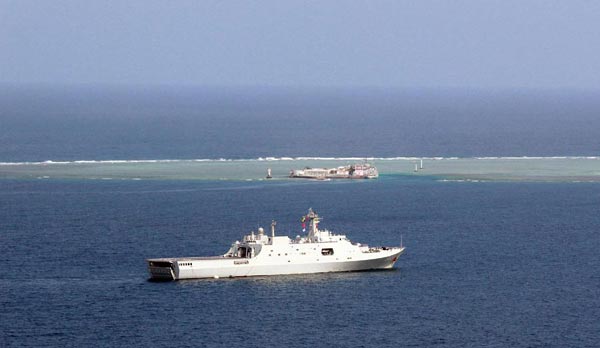 |
|
A formation of the Nanhai Fleet of China's Navy on Saturday finished a three-day patrol of the Nansha islands in the South China Sea. [Photo/Xinhua] |
It is not surprising that China's Foreign Ministry has responded with strong words to the accusations of countries such as the Philippines and the United States, which have intentionally played up China's construction work on some of its islands and reefs in the South China Sea.
Like singing a duet, Manila and Washington have competed with one another recently in criticizing China's reclamation work.
Manila has made all sorts of allegations, such as the work poses a threat to the island country's fishing industry and it violates the Declaration on the Conduct of Parties in the South China Sea.
Last month, it forced the Association of Southeast Asian Nations to issue a statement to express the bloc's "serious concerns" on the issue.
It also claimed that China will establish an air defense identification zone over the South China Sea. But this was refuted by the Chinese Foreign Ministry last week.
Washington, for its part, has openly thrown its weight behind its ally in Asia. Last month, US President Barack Obama said his country is concerned that China is using its "sheer size and muscle" to bully smaller claimants such as the Philippines and Vietnam in their maritime disputes with China.
On Saturday, the Pentagon released its annual report on the state of China's military. The report devotes a special section on China's dredging and island building in the South China Sea.
Those in the US obviously need to see China's island building in a more objective way. They may need a lesson in history as well, so they realize how the Philippines and Vietnam have over the years seized and occupied China's maritime territories bit by bit in the Nansha Islands.
China's ongoing construction in the South China Sea neither impedes freedom of navigation nor targets any third party.
In recent years, the Philippines and Vietnam have reclaimed land, built fixed facilities such as airports, and even deployed offensive weapons such as missiles, on Chinese islands and reefs they have illegally occupied.
Vietnam has constructed a number of buildings and helicopter platforms on Wan'an Tan, Xiwei Tan, Lizhun Tan and Aonan Ansh. The Philippines has built an airport and dock on Zhongye Dao in the Nansha Islands, and is constructing tourism facilities there, as well as on another two islands, Mahuan Dao and Feixin Dao.
Coveting China's maritime interests, Manila has not hesitated to act like a rogue. How it has illegally occupied China's Ren'ai Reef in the disputed waters is a case in point.
In 1999, a Philippine warship was stranded near the reef by "accident". Manila then refused to tow the warship away; instead it sent supplies and soldiers, incessantly rotating them, in an attempt to turn the military vessel into a permanent installation and so seize the reef.
Manila has enlisted the support from outside forces, Washington in particular, which have nothing to do with the maritime disputes. It is apparently playing up China's island building so that the US will pressure China over the issue.
That the Philippines started its first-ever joint military drills with Japan on Tuesday near disputed waters in the South China Sea is further proof that Manila is ganging up with Tokyo, which has a maritime dispute with China in the East China Sea, in an attempt to confront China and keep it on the wrong foot.
The Philippines has tried to internationalize the disputes too in disregard to its own commitment to the Declaration on the Conduct of Parties in the South China Sea. In 2013, it filed an arbitration case at The Hague questioning the maritime boundaries claimed by China.
This is a blatant violation to the DOC which clearly says parties concerned should undertake to resolve their territorial and jurisdictional disputes by peaceful means through friendly consultations and negotiations by the sovereign states directly concerned.
China will remain committed to its solemn vows to maintain peace and stability in the South China Sea. It will unswervingly defend its maritime territorial rights and interests too. Any finger-pointing and provocation in this regard will be to no avail.
The author is a senior writer with China Daily. wanghui@chinadaily.com.cn